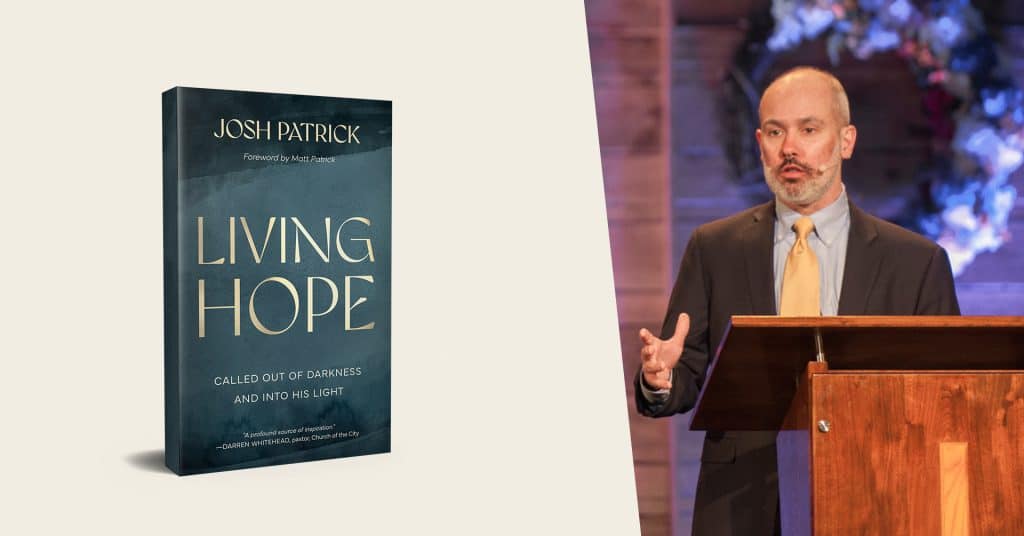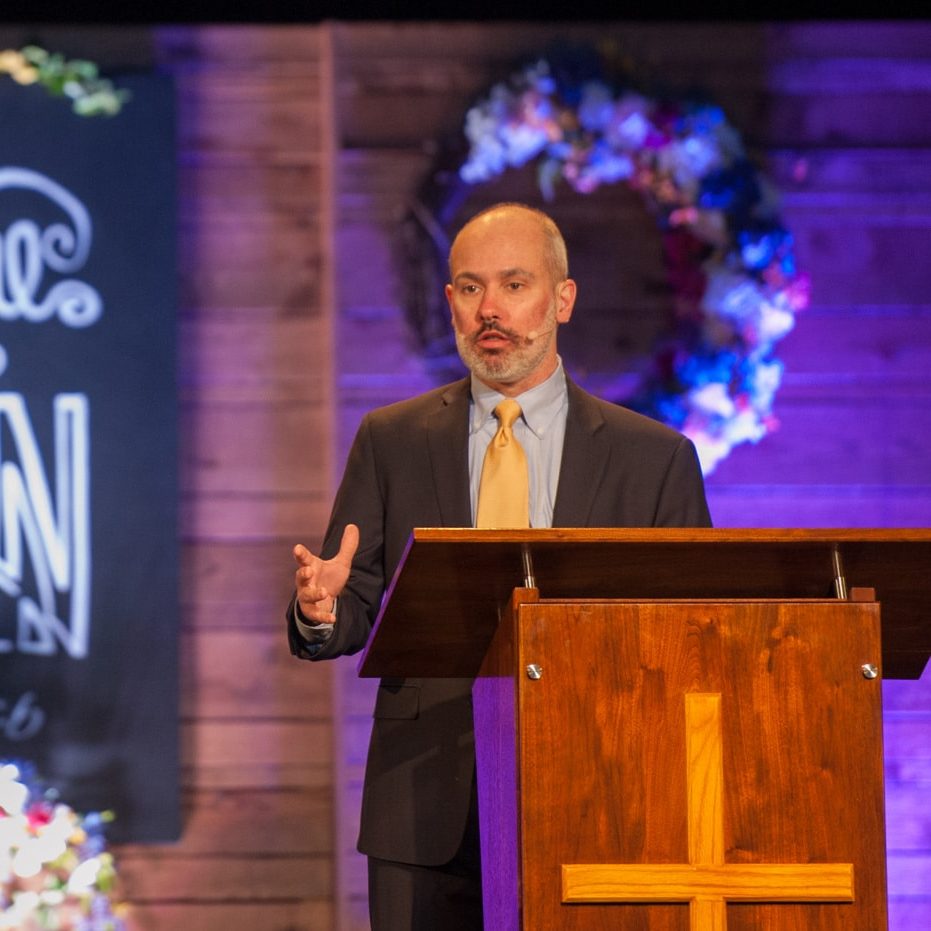Josh Patrick shows how God calls us to do hard things in 1 Peter 2:11–12: Abstain from sin and live good lives. This article describes those in sermon form!
The following is an excerpt from chapter 4 in Josh Patrick’s book Living Hope. Get this book for 50% off one copy and 60% off two or more for a limited time with coupon code “LIVING” when you purchase on our site here.
Everything up to this point in the series has focused on clarifying our identity as the sons and daughters of God and establishing the permanence of our living hope. Peter, in the first chapter, made at least seven statements about identity. Seven times he spoke to who we are in Christ.
In the passage from 1 Peter 2 that we’re addressing here, he asks us to obey Jesus in seven different ways—a fascinating coincidence if you ask me. From the beginning of 1 Peter to verse ten of chapter two, there are thirty explicit statements of encouragement—merely thirty-five verses into his letter, which in total is only five chapters and one hundred and five verses. By the second chapter, there are already thirty words of encouragement and seven affirmations of identity.
I take away two things from those data points.
1. First, the original hearers of his message must have been discouraged and oppressed and afraid. Following Jesus in the first century was a controversial, crazy, and dangerous proposition. Peter knew this. So it makes sense that he would want to encourage and affirm these people as much as he possibly could.
2. The second reason why I think we have seven identity statements and thirty words of encouragement—in the span of only thirty-five verses—is because he’s about to call us to do hard things. An excellent summary of 1 Peter 1:1–2:10 would be this: remember who you are. Beginning in 1 Peter 2:11, the focus is on becoming the person God calls you to be now that you know whose you are and are convinced of what he says about you.
1 Peter 2:11: Abstain from Sinful Desires
Verse eleven of chapter two begins the hinge point of 1 Peter:
Dear friends, I urge you, as foreigners and exiles, to abstain from sinful desires, which wage war against your soul.
Have you ever been around a foreigner before, someone clearly not from your area?
Maybe it’s their accent, their customs, the food they eat, or the music they listen to that tells you, but somehow you just know. A foreigner is distinct. They stick out.
The word “exile” is also an interesting choice of word. An exile is someone being led out either by will or by force from one place to another. They’re on a pilgrimage from somewhere they knew well to some other place.
Peter highlights a simple truth about you and me:
As followers of Jesus, we live by different rules.
We worship a very different Lord. The way we define success, the good life, beauty, and good and evil is often very different than whatever is common in our native territory.
In Philippians 3:20, Paul says, “Our citizenship is in heaven.” He doesn’t say that it will be in heaven but that it currently is. The minute you become a follower of Jesus, your citizenship transfer is complete. Now we don’t fully come into the blessings of that inheritance—which Peter so eloquently describes in chapter one—but our citizenship is instantly moved.
If you are a follower of Jesus, you are first and foremost a citizen of heaven, where God’s rule and reign remain unchallenged, and where his worship takes place in every moment. That place is your home.
Peter says that, in light of that reality, we should abstain from evil desires. He could have simply instructed us to stop doing bad things. He goes for the root, though.
Consider whose teaching example he’s following there: Jesus’, of course. He was personally discipled by Jesus, the most creative and brilliant articulator of inside-out spirituality. Jesus taught that the gospel wasn’t about behavior modification.
The Pharisees lived as though it was. For them, rules were everything, and it wasn’t about becoming a good person. It was about looking like a good person, about appearance rather than reality. Their teachings had a rank hypocrisy about them. Their dead religion reflected their dead hope, unfortunately.
Jesus taught that God wants to upend our disordered desires because an ugly part of our sinful nature is that we want many things that are not good for us. Jesus came not only to help us with that reality but to rescue us from it. In him, our desires can become transformed. He gives us the Holy Spirit, not just to help us do better but to help us desire better things. He’s going for a heart transformation that is deep and lasting and unmistakable—not mere superficial, short-lived behavior modification.
The stakes are immeasurably high.
Did you catch that? These evil desires wage war against you and me. Sounds a bit dramatic, but that’s the truth. Peter says there’s a war going on in your desires, and the war is against your soul.
You have a soul. You are not only flesh and bone. Part of you—an eternal part of you—has forces inside and outside of your being waging war against you. The forces inflict real harm, with the capability of keeping you from being strong and focused and passionate and pure in your worship of God.
If you’re wondering, What are the sinful desires I should be abstaining from? only lift your eyes from verse eleven up to verse nine. Just before the hinge of verse eleven, you can find in a clear and wonderful way what your purpose is.
As followers of Jesus, we have been called out of darkness and into his light.
Once we were not a people, but now we are a people that we may declare the praises of him who has rescued us from sin and death.
We’re here for that reason, and so we abstain from any desire that hinders the passionate pursuit of God. It’s a pretty sweeping call, admonishing us as God’s children to take rigorous, personal inventory of our lives because God desires and demands goodness.
1 Peter 2:12: Live Good Lives
Live such good lives among the pagans that, though they accuse you of doing wrong, they may see your good deeds and glorify God on the day he visits us. (1 Pet. 2:12)
“Pagans” is an interesting word not often used. The original word means “Gentiles.” In our context, it often refers to people who do not worship the one, true God or acknowledge the exclusive claims of Jesus Christ.
Right there in verse eleven, it says, “Though they accuse you of doing wrong.” Well, for us, the accusations are piling up these days, aren’t they? Close-minded. Simpletons. Fundamentalists. Hateful. For them, it was far, far worse.
Peter says your life should be so distinct, so inspiring, and so encouraging that people will look at your life and be moved to worship and glorify God. The idea comes from Jesus himself.
A living hope runs counterintuitively to life on earth.
It’s uncanny in an inexplicably attractive way, and that’s how others are drawn in. We are to reflect the light of Christ’s living hope.
Matthew 5:13 says, “You are the salt of the earth. But if the salt loses its saltiness, how can it be made salty again? It is no longer good for anything, except to be thrown out and trampled underfoot.” What was the purpose of salt in the first century? It flavored and preserved food. The whole notion of Christianity being boring is just not true. It’s zesty. It’s flavorful. Jesus is anything but boring—and a life with him is anything but lifeless and predictable.
Matthew 5 continues:
You are the light of the world. A town built on a hill cannot be hidden. Neither do people light a lamp and put it under a bowl. They put it on its stand, and it gives light to everybody in the house. In the same way, let your light shine before others, that they may see your good deeds and glorify your father in heaven. (Matt. 5:14–16)
Peter, a disciple of Jesus, is saying the very same thing.
Peter says that our good deeds should be so inspiring that they provoke unbelievers—pagans—to glorify God on the day he visits us. He doesn’t explain the phrase “on the day he visits,” but I assume he means the day when Christ returns, when all things are made new, and we all bow down—whether we do it willingly or by force—to King Jesus. By heaven’s standards, a good life is focused on the kind of person we’re becoming.
This text demands we ask the question, Who am I becoming?
This is an excerpt from chapter 4 in Josh Patrick’s book Living Hope. Read more when you get this book for 50% off one copy and 60% off two or more for a limited time with coupon code “LIVING” when you purchase on our site here.


